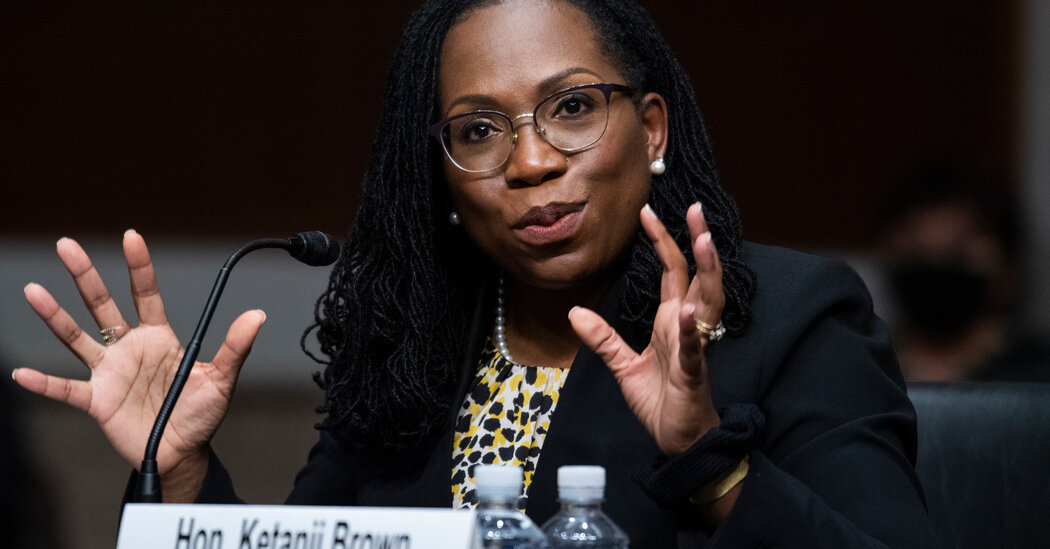Attention quickly turned on Wednesday to Judge Ketanji Brown Jackson as one of a small number of likely options who could fulfill President Biden’s pledge to nominate the first Black woman to the Supreme Court, after the disclosure that Justice Stephen G. Breyer has decided to retire.
Judge Jackson, 51, already successfully went through the Senate confirmation process last year, when Mr. Biden elevated her from the Federal District Court in the District of Columbia to the powerful U.S. Court of Appeals for the D.C. Circuit.
She was confirmed to the appeals court in June by a 53-to-44 vote. All 50 members of the Democratic caucus voted for her, as did three Republican senators: Susan Collins of Maine, Lindsey Graham of South Carolina and Lisa Murkowski of Alaska. Three Republicans did not vote.
Judge Jackson, who clerked for Justice Breyer during the Supreme Court’s 1999-2000 term, was born in Washington, D.C., and grew up in Miami. She graduated from Harvard College and Harvard Law School.
She worked several legal jobs early in her career, including as a staff member for the United States Sentencing Commission and, from 2005 to 2007, as an assistant federal public defender in Washington. In 2012, President Barack Obama nominated her to serve as a district court judge in the capital.
During her eight and a half years on the Federal District Court bench, Judge Jackson handled a number of challenges to executive agency actions that raised questions of administrative law. She also heard several cases that attracted particular political attention.
Among them, in 2019, she ruled that Donald F. McGahn II, the former White House counsel to President Donald J. Trump, had to obey a congressional subpoena seeking his testimony over Mr. Trump’s efforts to obstruct the Russia investigation.
“Presidents are not kings,” she wrote, adding that current and former White House officials owe their allegiance to the Constitution. “They do not have subjects, bound by loyalty or blood, whose destiny they are entitled to control.”
The Trump Justice Department appealed the ruling, but Mr. McGahn eventually did testify behind closed doors last year, after the Biden administration struck a deal with House Democrats to resolve the dispute.
But while Judge Jackson ultimately ruled against Mr. Trump in the McGahn case, she also indirectly helped him by consuming nearly a third of a year to resolve what was merely the first stage of a case that would inevitably be appealed, including writing a 120-page opinion.
Her handling of that case was a prime example of how Mr. Trump’s legal team successfully used the slow pace of litigation to run out the clock on congressional oversight efforts, effectively winning despite court rulings against them. Against that backdrop, Judge Jackson’s handling of another high-profile case recently was notably more attuned to the real-world consequences of judicial delay.
After Mr. Biden elevated Judge Jackson to the appeals court in 2021, she was part of a three-judge panel that heard Mr. Trump’s challenge to a congressional subpoena for White House records related to the Capitol riot. In December, less than a month after that case was docketed before them, they ruled that Congress could see the documents. The Supreme Court this month affirmed that outcome, completing the dispute’s unusually rapid resolution.
Judge Jackson has two daughters and is related by marriage to Paul D. Ryan, the former House speaker and Republican vice-presidential candidate. Her husband, Patrick G. Jackson, is a surgeon and the twin brother of Mr. Ryan’s brother in-law. At her 2012 confirmation hearing to be a district court judge, Mr. Ryan testified in her support, calling her “clearly qualified” and “an amazing person.”
“Our politics may differ, but my praise for Ketanji’s intellect, for her character, for her integrity, it is unequivocal,” Mr. Ryan said. “She is an amazing person, and I favorably recommend your consideration.”


























